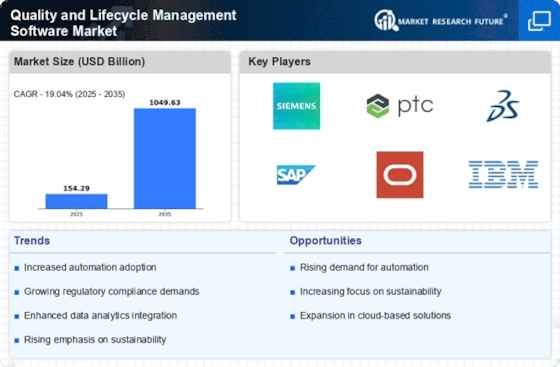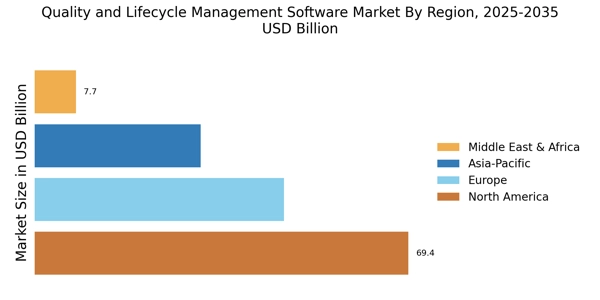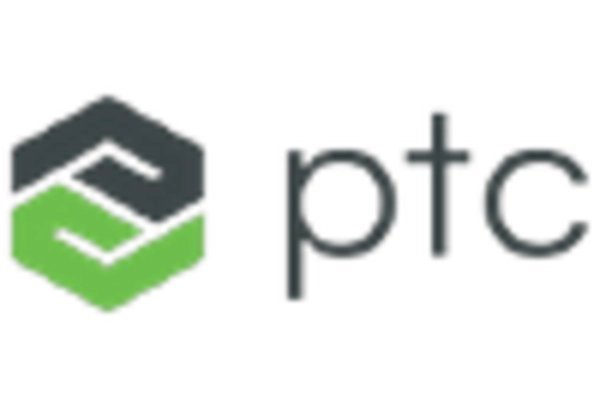Rise of Cloud-Based Solutions
The rise of cloud-based solutions is transforming the Quality and Lifecycle Management Software Market. Organizations are increasingly migrating to cloud platforms due to their scalability, cost-effectiveness, and ease of access. Cloud-based software allows for real-time collaboration among teams, regardless of geographical location, which is particularly beneficial for multinational corporations. Recent statistics indicate that the adoption of cloud-based quality management solutions is expected to grow by 15% annually. This shift towards cloud technology not only enhances operational efficiency but also enables organizations to stay agile in a rapidly changing market environment, thereby reinforcing their commitment to quality and lifecycle management.
Focus on Continuous Improvement
The focus on continuous improvement is a fundamental driver in the Quality and Lifecycle Management Software Market. Organizations are increasingly adopting methodologies such as Lean and Six Sigma to enhance their operational efficiency and product quality. This commitment to continuous improvement necessitates the use of sophisticated software solutions that can track performance metrics, identify areas for enhancement, and facilitate corrective actions. The market is expected to see a rise in demand for software that supports these methodologies, as companies strive to foster a culture of quality and innovation. This trend not only improves product outcomes but also contributes to long-term sustainability and competitiveness.
Emphasis on Regulatory Compliance
The emphasis on regulatory compliance is a significant driver in the Quality and Lifecycle Management Software Market. Organizations are under constant pressure to adhere to stringent regulations across various sectors, including pharmaceuticals, manufacturing, and food safety. Compliance failures can lead to severe penalties and reputational damage, prompting companies to invest in robust quality and lifecycle management solutions. The market for compliance-related software is projected to grow at a compound annual growth rate (CAGR) of 12% over the next five years. This growth reflects the increasing need for software that not only ensures compliance but also enhances overall quality management processes, thereby safeguarding organizations against potential risks.
Growing Demand for Data Analytics
The growing demand for data analytics capabilities within Quality and Lifecycle Management Software is reshaping the market landscape. Organizations are increasingly leveraging data analytics to gain insights into product performance, customer feedback, and operational efficiency. This trend is particularly pronounced in industries such as automotive and aerospace, where data-driven decision-making is crucial for maintaining competitive advantage. The Quality and Lifecycle Management Software Market is witnessing a surge in solutions that incorporate advanced analytics features, enabling organizations to make informed decisions based on real-time data. As a result, companies that adopt these analytics-driven solutions are likely to experience enhanced product quality and reduced time-to-market.
Integration of Quality Management Systems
The integration of Quality Management Systems (QMS) with Lifecycle Management Software is a pivotal driver in the Quality and Lifecycle Management Software Market. This integration facilitates seamless data flow across various departments, enhancing collaboration and efficiency. As organizations increasingly recognize the importance of a unified approach to quality and lifecycle management, the demand for integrated solutions is expected to rise. According to recent data, companies that implement integrated QMS report a 20% reduction in operational costs and a 30% improvement in product quality. This trend indicates a growing preference for software that not only manages quality but also aligns with lifecycle processes, thereby streamlining operations and ensuring compliance with industry standards.


















